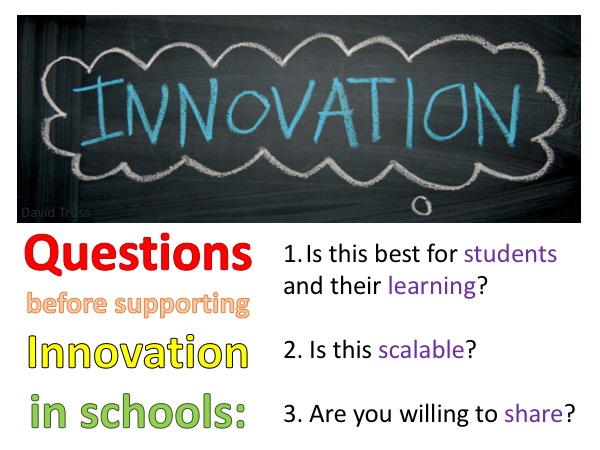1. Is this best for students and their learning?
2. Is this scalable?
3. Are you willing to share?
In a conversation with my good friend, Dave Sands, we were talking about the challenge of investing in systematic change vs supporting the outliers (and the Lone Wolves). There will always be limited resources to work with, and we can’t do everything we want to do. Of course, it is important to invest in systematic change, and to have everyone (every school, educator and student) benefit from the allocation of resources, but if we don’t support the individual pioneers, the innovators, then we may not see the possibilities to make exponential changes, rather than just incremental ones.

I threw these questions out as precursors to supporting projects by innovative educators, because each of the questions are essential to making the support worth it.
1. Is this best for students and their learning?
Sometimes ideas look innovative at first glance, but they are not focussed on what is really important. They might make things easier for the teacher, or easier to assess things that are not important, or they might have a lot of flash but not a lot of substance. If the student and the learning comes first, then it is time to ask the next two questions.
2. Is this scalable?
Not everything has to scale, and get bigger, but can it be duplicated in other classrooms? Can it be something that goes beyond a single classroom or event?
3. Are you willing to share?
It won’t scale unless people know about it. When you do something great, it needs to be shared. The ‘how’ doesn’t matter as much as the commitment to do so. One important note here is that it doesn’t have to be polished, and it doesn’t have to be about something that worked perfectly, where everything went right. We can learn through failure, and through understanding the challenges that people face along the way.
– – –
There are ‘pockets of brilliance’ happening in schools all over the world that don’t seem to scale. This brilliance needs to be supported. We need to encourage new, creative and innovative practices. However, in world of limited resources, we also need to ensure that what we learn as we innovate, is done for the right reasons, is something that can be replicated, and is something that will be meaningfully shared.
Also published on Medium.

Interesting as ever David. I find scalable the biggest challenge, because it involves an element of predicting the unknown. Not only do I need to consider the differences of somebody else’s classroom, but also what happens to an idea when it scales, that is how it changes and morphs.
I am currently grappling with this question in regards to the idea of communities of practice (http://readwriterespond.com/?p=2563). I had developed what I thought was a sufficient platform to support learning, but then Sheryl Nausbaum-Beach pointed out that it won’t scale. As much as I can see where she is coming from, it can be hard to imagine the challenges and consequences that you have never faced.
Not sure if that makes sense.
Aaron
Hi David,
Always good when I stumble upon your thoughts and musings …. I like these questions and they really do clarify and clear the mind for those creating and “making change” in education.
It might be obvious but I’d also add one more, one of the following – Is your heart in it? Are you there for the long term? Would you do this even if nobody joined or listened?
I’m going to be reaching out to educators this fall to share and test my new literacy site – Gif Lingua Books. http://book.giflingua.com For me, it answers yes to all these questions.
Dave, I loved this conversation the other morning and am glad you were able to summarize and share it with such elegance. I haven’t been able to stop thinking about these three key questions and offer these thoughts to further the conversation.
In regard to determining what’s best for students and learning, we must go beyond our “gut feeling” and continue to access and acknowledge research that will improve our practice and enhance student learning. We now know too much, most of which has contributed to a “moral authority” on our part as professionals, ignoring this knowledge is wasteful and negligent.
With scalability comes a responsibility to every student in our immediate District not just school or classroom. With resources as limited as they are, we need to be thoughtful as to how we are utilizing them ensuring that their impact is as far reaching as effective.
Lastly, a willingness to share. I would add that it is not simply about sharing but leading. Everyone has the capacity to lead and the fact that people are willing to innovate suggests a level of risk taking, creativity, and motivation to be better suggests that they can lead.
We need to empower those with the courage to take action with respect to 1. What is the “right thing” to do? 2. How will it work with ALL students? and 3. In what way will I influence and motivate others to do the same?
As always Dave, I look forward to our next conversation.
The “other” Dave